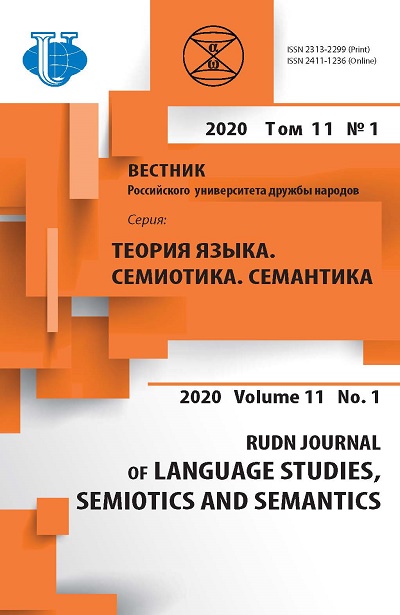Semantic Anglicisms in French Internet Forum
- Authors: Lunkova L.N.1, Bukina L.M.1
-
Affiliations:
- State Educational Institution of Higher Education of Moscow Region State University of Humanities and Social Studies
- Issue: Vol 11, No 1 (2020)
- Pages: 92-101
- Section: FUNCTIONAL GRAMMAR AND SEMANTICS
- URL: https://journals.rudn.ru/semiotics-semantics/article/view/23045
- DOI: https://doi.org/10.22363/2313-2299-2020-11-1-92-101
- ID: 23045
Cite item
Full Text
Abstract
Semantic assimilation is a many-sided and a multidimensional phenomenon assuming a number of analysis approaches. The article is a study of the semantic borrowing process due to either graphical or phonetic identity of lexical units. It discusses general semantic transformations of the English language borrowings alongside with the examples of semantic anglicisms in the French Internet discourse. The global tendency is that the French language is daily receipting quite a number of English words the Internet discourse being one of the leading media. To specify the borrowing patterns in the French language at the semantic level the net forum genre is chosen as a specific combination of oral and written speech features giving a most outstanding and evident picture of all linguistic tendencies. The work is an attempt to define what a semantic anglicism is and what linguistic mechanisms are involved in the process when French lexemes undergo semantic transformations due to their either graphical or phonetic likeness to English ones. The research topicality is conditioned by the nature of the global Internet discourse itself the latter being the speech type abundant in all kinds of borrowings anglicisms in particular. The research background is the legal French policy to defend the national language and the French linguists struggle against anglicisms overwhelming penetration into French. The analysis is also held through experimental French native speakers interviewing for the excessive use of English words and its expediency. The research methods are structural-semantic, comparative, statistical. The units under study are English language semantic borrowings in the French internet forum held by native French language speakers.
About the authors
Larisa N. Lunkova
State Educational Institution of Higher Education of Moscow Region State University of Humanities and Social Studies
Author for correspondence.
Email: lora@list.ru
Dr. habilis, Professor of Germanic-romance languages and methods of their teaching Department, Faculty of Foreign Languages
30, Zelyonaya str., Kolomna, Russia, 140410Liliya M. Bukina
State Educational Institution of Higher Education of Moscow Region State University of Humanities and Social Studies
Email: lilehka1985@gmail.com
Senior lecturer at the Department of Germanic-romance languages and methods of their teaching, Faculty of Foreign Languages
30, Zelyonaya str., Kolomna, Russia, 140410References
- Allinne, F. (1999). Les faux amix de l’anglais. Paris: Belin. (In French).
- Nelyubova, N.Yu. (2019). Representation of ethno-cultural values in the proverbs of Frenchspeaking Countries, RUDN Journal of Language Studies, Semiotics and Semantics, 10 (2), 323—335. doi: 10.22363/2313-2299-2019-10-2-323-335. (In Russ.).
- Cerquiglini, B. (2000). Le français dans tous ses états. Paris: Flammarion. (In French).
- Aubrée, M. (2004). Parlons français. Paris: Glyphe. (In French).
- Gilder A. (1996) Et si l’on parlait Français? Paris: Le Cherche Midi. (In French).
- Actualités informatique et numérique au quotidien. URL: https://www.nextinpact.com (accessed: 15.05.2018). (In French).
- Loi no 75-1349 du 31 décembre 1975 relative à l’emploi de la langue française. URL: https://www.legifrance.gouv.fr/affichTexte.do?cidTexte=JORFTEXT000000521788&dateTe xte=19940804 (accessed: 15.02.2017). (In French).
- Loi no 94–65 du 4 août 1994 relative à l’emploi de la langue française. URL: https://www.legifrance.gouv.fr/affichTexte.do?cidTexte=LEGITEXT000005616341 (accessed: 21.03.2017). (In French).
- Kuralesina, E.N. (2011). Legislative framework of modern French policy on the French language, Izvestia: Herzen University Journal of Humanities & Sciences, 131, 186—190. (In. Russ.).
- Décret no 96-602 du 3 juillet relatif à l’enrichissement de la langue française. URL: https://www.legifrance.gouv.fr/affichTexte.do?cidTexte=JORFTEXT000000378502 (accessed: 15.02.2017). (In French).
- Kruglyak, E.E. (2009). Semantic Anglicisms in Francophone Canadian Print Media, Izvestiya of Saratov University. New Series. Series: Philology. Journalism, 9(2), 28—30. (In Russ.). (In French).
- Shchitova, O.G. (2007). Patterns of semantic assimilation neiskonnye of the middle Ob dialects vocabulary (on the material of Tomsk business documents of the XVIIth century), Vestnik tomskogo gosudarstvennogo pedagogicheskogo universiteta, 7, 45—52. (In Russ).
- Kruglyak, E.E. (2006). Semantic changes in the conditions of language contact (based on the socio-political vocabulary of the French language)) [dissertation]. Saratov. (In Russ.).
- Dyakov, I.A. (2012). Anglicisms: borrowing or word formation. Filologicheskie nauki voprosy teorii I praktiki, 5 (6), 72—76. (In. Russ.).
- French forum ForumFr. URL: https://www.forumfr.com (accessed: 12.01.2017). (In French).
- Larousse: enciclopédie and free online dictionaries. URL: https://www.larousse.fr (accessed: 12.04.2017). (In French).
- Cambridge Dictionary Online. URL: http://dictionary.cambridge.org (accessed: 12.04.2019).
- Potebnya, A.A. (1981). History of the Russian language. The lectures given in 1882/3 academic year at the University of Kharkov (Publikatsiya S. F. Samoilenko) In Potaninskiy reading. Кiev: Naukova dumka. pp. 119 — 168. (in Russ.).
- Denisenko, V.N. & Zhang, Ke (2018). Computer and network word in the Russian-language and Chinese-language communicative Internet space, RUDN Journal of Language Studies, Semiotics and Semantics, 9(4), 911—925. doi: 10.22363/2313-2299-2018-9-4-911-925. (In Russ.).
- Voiskunsky, A.E., Petrenko, V.F. & Smyslova, О.V. (2003). Hackers' motivation: psychosemantical research, Psychological Journal, 24(1), 104—118 (In Russ.).
Supplementary files












